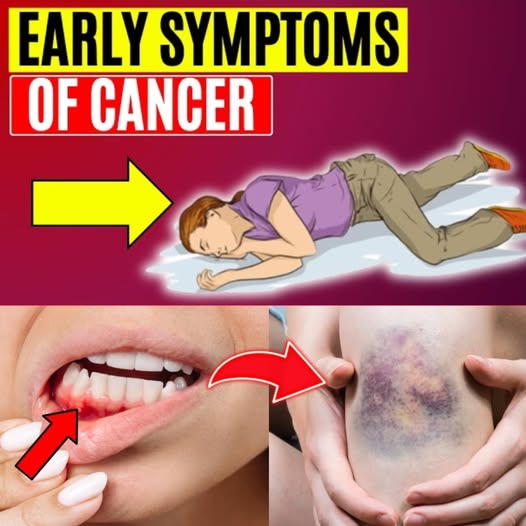Introduction:

Cancer doesn’t always arrive with a loud announcement—it often whispers in subtle, silent symptoms. That’s why spotting early cancer signs is not just helpful—it’s life-saving.
In today’s fast-paced world, it’s easy to brush off seemingly minor issues. But what if your body is trying to tell you something serious? Recognizing early warning signs of cancer could be the difference between a manageable diagnosis and a late-stage battle.
This blog dives into the 12 early cancer symptoms you should never ignore. We’ll answer the most frequently asked questions about these red flags and provide actionable steps to take immediately if you experience them.
Did you know? According to the American Cancer Society, nearly 1 in 2 men and 1 in 3 women will be diagnosed with cancer at some point in their lives. Early detection drastically improves outcomes—sometimes by more than 80%.
Let’s uncover these warning signals your body might be sending.
🚨 The 12 Early Cancer Signs You Can’t Afford to Ignore
1. Unexplained Weight Loss
Sudden weight loss of 10 pounds or more without any change in diet or activity can be a red flag.
Why it matters: Cancer cells consume your body’s nutrients, leading to rapid fat and muscle loss. Common culprits include pancreatic, stomach, esophageal, and lung cancers.
👉 What to do: If you’re losing weight unintentionally, especially rapidly, consult a healthcare provider immediately for blood tests or imaging.
2. Persistent Fatigue
Fatigue that doesn’t go away with rest can indicate leukemia or colon cancer, especially when combined with other symptoms.
Don’t confuse this with being “tired.” Cancer-related fatigue is debilitating and constant.
👉 What to do: Keep a symptom journal. If fatigue continues for more than 2-3 weeks, seek a professional evaluation.
3. Skin Changes
From darkening skin (hyperpigmentation) to yellowing (jaundice), skin changes can be a sign of liver, pancreatic, or skin cancers.
Warning signs include:
- New moles or freckles
- Moles changing in size, shape, or color
- Bleeding or itching lesions
👉 What to do: Follow the ABCDE rule for melanoma—Asymmetry, Border, Color, Diameter, Evolution. If anything seems off, get a skin check.
4. Chronic Cough or Hoarseness
A cough that lingers more than three weeks, especially if accompanied by blood or voice changes, may be a sign of lung, throat, or thyroid cancer.
👉 What to do: Don’t just treat it with lozenges. Ask for a chest X-ray or CT scan if the cough persists.
5. Unusual Bleeding
Unexpected bleeding is always a serious warning sign.
This includes:
- Blood in urine (possible bladder or kidney cancer)
- Vaginal bleeding outside of periods or post-menopause (possible cervical or uterine cancer)
- Blood in stools (possible colon cancer)
- Coughing up blood (lung cancer)
👉 What to do: Any bleeding that’s not clearly explainable must be investigated urgently.
6. Lumps or Thickening Under Skin
Not all lumps are cancer—but many cancers first present as a lump in the breast, testicles, lymph nodes, or soft tissues.
👉 What to do: Don’t wait to see if it goes away. Early testing can mean early treatment and survival.
7. Difficulty Swallowing or Persistent Indigestion
Persistent heartburn or a feeling that food is stuck in your throat can point to esophageal or throat cancer.
Fun fact: People over 50 with GERD symptoms are at higher risk for Barrett’s esophagus, a precancerous condition.
👉 What to do: Request an endoscopy if indigestion or swallowing issues persist for over 2 weeks.
8. Persistent Pain
Chronic, unexplained pain could signal bone cancer, brain cancer, or ovarian cancer, depending on the location.
👉 What to do: Pain that lasts more than a few weeks without a clear cause should be assessed with scans or blood work.
9. Changes in Bowel or Bladder Habits
Frequent urination, blood in the urine, diarrhea, constipation, or narrow stools can be signs of prostate, bladder, or colon cancer.
👉 What to do: Track your habits. Early colonoscopy or PSA test can be life-saving.
10. Sores That Won’t Heal
A sore that doesn’t heal, especially in the mouth, on the skin, or on the genitals, might indicate skin, oral, or cervical cancer.
👉 What to do: If a sore lasts more than 2 weeks, get it biopsied. Don’t ignore signs like bleeding or crusting.
11. Unusual Bloating
Persistent bloating, especially in women, can signal ovarian or stomach cancer. If accompanied by pelvic pain, early satiety, or weight loss, it’s even more concerning.
👉 What to do: Request a pelvic ultrasound and CA-125 blood test if symptoms linger.
12. Night Sweats or Fever Without Infection
Constant night sweats or low-grade fever without illness may indicate leukemia or lymphoma.
👉 What to do: Especially if accompanied by weight loss or swollen lymph nodes, insist on CBC blood testing.
🧠 Frequently Asked Questions (FAQs)
❓ Is it really cancer if I have one of these symptoms?
Not necessarily. Many of these signs can be related to benign conditions. But ignoring them is risky. Early testing rules out or confirms concerns, allowing for timely action.
❓ What type of doctor should I see?
Start with your primary care physician. They can refer you to a specialist (oncologist, ENT, gastroenterologist, etc.) depending on the symptom.
❓ How soon should I act if I notice a symptom?
Immediately. Don’t wait longer than two weeks if symptoms persist. Cancer can progress silently.
❓ What are the top cancers with subtle early signs?
- Pancreatic cancer – shows almost no signs until it’s advanced.
- Ovarian cancer – early bloating and pelvic pain often ignored.
- Colon cancer – hidden in bowel changes.
- Lung cancer – often confused with a persistent cold or allergy.
❓ Are there any preventative measures I can take?
Yes. Follow these cancer-prevention best practices:
- Quit smoking
- Limit alcohol
- Maintain a healthy weight
- Exercise regularly
- Get routine screenings (mammograms, colonoscopies, Pap smears)
- Eat a diet rich in fruits, vegetables, and fiber
📊 The Cold, Hard Facts (Statistics You Need to Know)
- 60% of cancers could be prevented or caught early with better awareness and screening.
- Early-stage cancer has a 5-year survival rate of 80–99%, while late-stage often drops below 30%.
- Lung, colorectal, breast, and prostate cancers are among the most common—but are also highly treatable if caught early.
🧭 Conclusion: Don’t Wait—Early Detection Saves Lives
Ignoring symptoms because you’re “too busy” or “don’t want to overreact” can have devastating consequences. When it comes to cancer, early action is power.
You now know the 12 early cancer signs you can’t afford to ignore. This knowledge isn’t just for you—it could save a loved one’s life. Share this with your network and spread awareness.
Takeaway: Be your own health advocate. Your body speaks—listen closely.
📌 Final Tip:
Schedule a yearly health screening, even if you feel perfectly fine. Prevention and early detection are your best weapons against cancer.
Stay alert. Stay informed. Stay alive.


